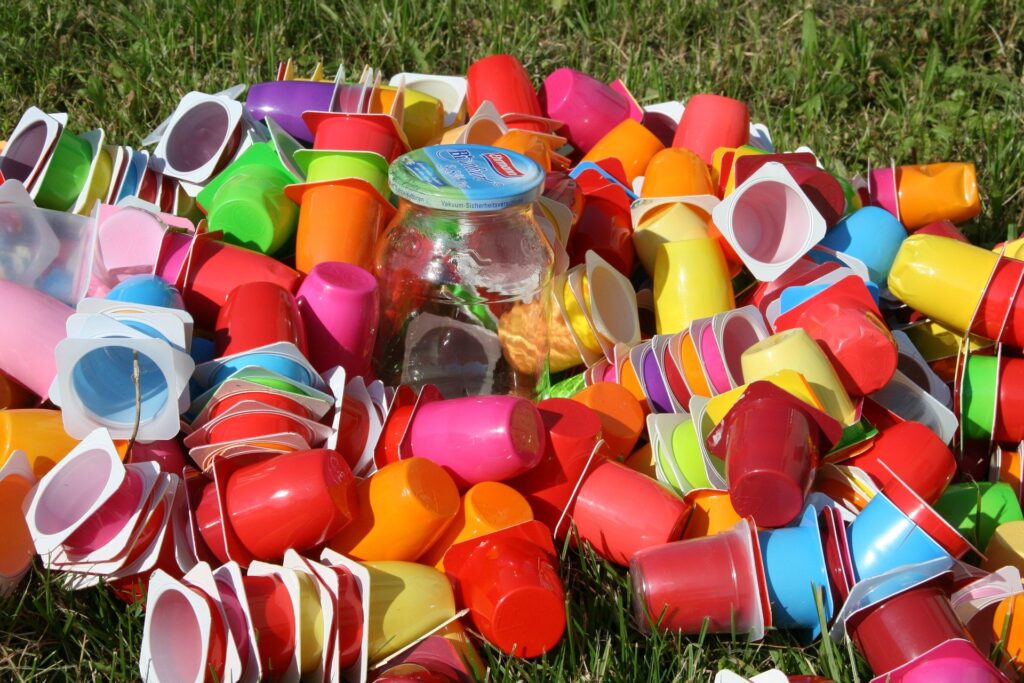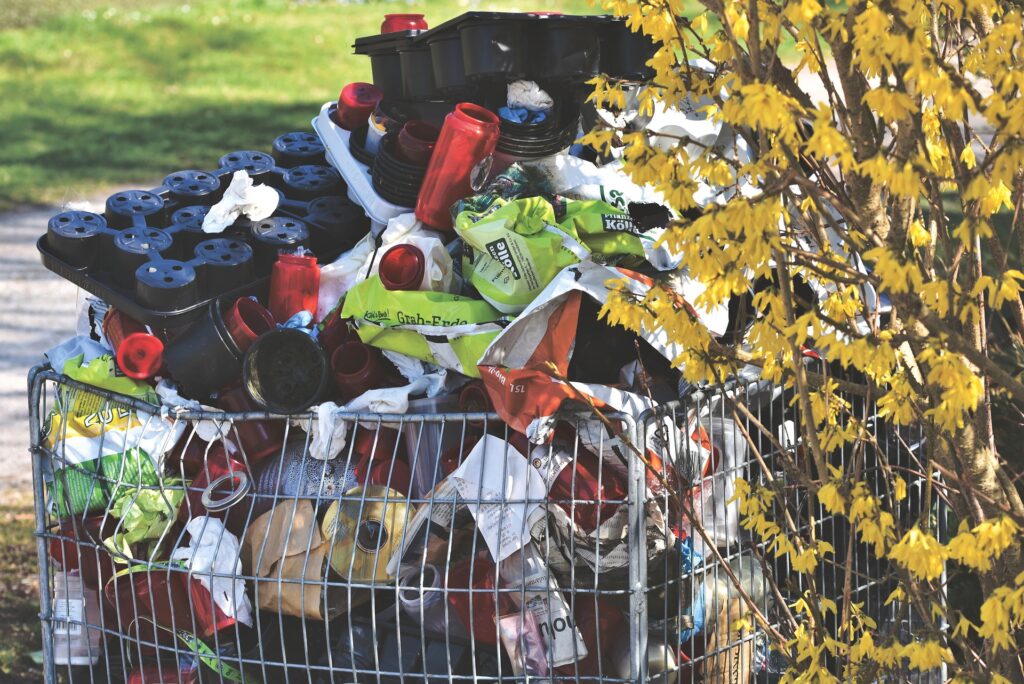Sections in this article:
- How much plastic gets recycled?
- What is the UK Government doing about the plastic problem?
- What others are doing about the problem
- Going zero waste
Why is plastic a problem?
We all know that plastic is everywhere, in our clothing, footwear, food and drink products, beauty products, building materials, vehicles, the list goes on. Plastic was first made in the mid-20th century and due to being robust, lightweight and low cost, it was considered to be a wonder product and as a consequence of its abundance, it is now one of the World’s greatest pollution challenges.
According to the UK Government, it is estimated that five million tonnes of plastic is used every year in the UK, nearly half of which is packaging and demand is rising, although some of these statistics have been questioned for their accuracy both by the National Audit Office and WWF-UK both claiming that figure is higher.
The problem with plastic is that it stays in the environment for centuries. It doesn’t disappear, it just breaks down into tiny pieces that continue to pollute the environment. Scientists have found plastic in air, drinking water, rivers, soils, oceans, sealife and human stools. We repeatedly see news reports of marine and land mammals found dead, tangled in plastic or plastics found in their stomachs. Chemicals also leach from the plastics and habitats suffer as a consequence.
A science report commissioned by the UK Government to understand the impact of a changing marine environment stated that between 2015 and 2025, if we do not act, marine plastic pollution is set to treble world-wide to 150 million tonnes.
Scientists estimate we are producing over 300 million tons of plastic every year. An estimated eight million tonnes of plastic waste enters the sea each year.
Devastating evidence of the damage to wildlife and habitats has been shown in programmes such as Blue Planet II on the BBC, and Sky’s Ocean Rescue campaign.
When you consider the above, it is really quite shocking to realise that an estimated 50% of the 300 million tons of plastic being produced is single-use. We use it for just a few moments, but it remains on the planet for centuries, long after we have gone, our children have gone, our grandchildren, their children, their children and … well you get the message.
So how much of the UK’s plastic actually gets recycled?
On the 21 September 2020 a government briefing paper was released on plastic waste, setting out the scale of plastic in the UK, the Government ambitions, targets and proposals for change.
A 2018 report by the Local Government Association found only one-third of plastics collected from households can be recycled, due to contamination, low-grade and mixed materials and technical difficulties.
According to Recycle Now some of the plastics can be recycled in the UK and other types, will require new technology before we are able to recycle it effectively. This means that some plastic still goes to landfill, some is incinerated and some shipped abroad for recycling.
When plastics reach the Council’s contracted plant, the plastics are sorted by polymer type; shredded; washed; melted; pelletised and made into new products.
This is a two-stage process:
1. Sorting is mainly done automatically with a manual sort to ensure all contaminants have been removed.
2. Once sorted and cleaned, plastic can either be shredded into flakes or melt processed to form pellets before finally being moulded into new products
China stopped importing waste in January 2018, which had been the main country the UK exported plastics to. Since then the UK has started exporting to more countries, including Turkey, Egypt and Malaysia.

We have all seen the images like this one, often showing adults and children sifting through mountains of rotting rubbish.
These countries lack the facilities to recycle their own plastics, let alone plastics from elsewhere.
It is no surprise that most plastics Turkey promises to recycle are actually burned, buried or dumped.
COVID-19 has made the UK’s recycling problem much worse with the use of single-use plastics, including disposable masks and increase in online shopping. All of these factors have increased the amount of plastic waste the UK exports, and increased the likelihood that it will be dumped.
How does the UK Government propose to deal with the plastic problem?
To tackle the many sources of plastic pollution, we need legislation that commits the Government to phasing it out. In 2018 under the Prime Minister May Conservative Government, the Resources and Waste Strategy was published, which sets out the Government’s ambition to move towards a more circular economy, to “become a world leader in using resources efficiently and reducing the amount of waste we create as a society”. It also set out the “strategic ambition” to “work towards all plastic packaging placed on the market being recyclable, reusable or compostable by 2025.
Many of the policy recommendations in that Strategy were continued by the Johnson Government and have been included in the Environment Bill 2019-20, which sets how the UK Government plans to protect and improve the natural environment in the UK. The progress of this Bill through Parliament has been shelved during the Covid-19 pandemic.
The Government’s September 2020 briefing paper on plastic waste sets out the proposals for change as follows:
- A plastic packaging tax. A consultation on the proposals closed on 20 August 2020. A Government response has not yet been published.
- Packaging producer responsibility. The Environment Bill 2019-20 contains proposals to amend producer responsibility scheme rules. It contains provision for those involved in the “manufacture, processing, distribution or supply of products or materials” to be required, by regulations, to pay for or contribute to the costs of disposing of those items.
- Disposable cups levy.
- Ban on single use plastic. Regulations came into force in October 2020 prohibiting the supply of plastic straws, cotton buds and stirrers.
- Deposit return scheme for drinks containers. Proposals to establish this scheme have been put forward in the Environment Bill 2019-20.
- Consistency in household recycling. Provisions to amend household recycling are included in the Environment Bill 2019-20.
- Single use carrier bags charge. In August 2020 the Government confirmed that it will extend the single-use carrier bag charge to all businesses in England supplying goods. The Government also confirmed that it will increase the minimum mandatory charge from 5p to 10p, expected to begin from April 2021. However, the charge has been temporarily suspended during Coronavirus.
- Funding to reduce plastic waste.
There are also a number of voluntary initiatives aimed at changing the way that plastics are designed, produced, used, re-used, disposed of and reprocessed by.
Examples include:
- Plastics Pact – A collaboration of businesses, which has set a target to eliminate unnecessary single-use plastic packaging, for all plastic packaging to be re‑usable, recyclable or compostable and for 70% to be recycled or composted by 2025.
- Plastics Industry Recycling Action Plan (PIRAP) – An industry action plan which includes: increased collection of recyclable plastics; improved sorting; and developing end markets for recycled plastics.
- UK Circular Plastics Network (UKCPN) – Aims to bring together plastic product users through a programme of networking and knowledge-sharing events.
What are others doing about the problem?
Some supermarkets and retailers are finally starting to introduce initiatives aimed at reducing plastic packaging, having plastic-free aisles and allowing customers to use their own packaging containers.
The company Terracycle aims to eliminate the idea of waste by recycling the “none recyclable”. They partner with individual collectors, so you or me, as well as major consumer product companies, retailers and manufacturers, small businesses across 20 different countries. Their aim is to divert millions of pounds of waste from landfills and inclinators each month. You can easily search the products they can recycle and whether there is a drop off point near you by using their locator.
In September 2020 Boots launched a new in-store beauty recycling scheme. For every five products you recycle, you’ll get 500 Advantage Card points!
The retailer is the first to implement Scan2Recycle technology on the high street, which will allow customers to track how much packaging they have recycled and be rewarded. All you have to do register on the Boots Scan2Recycle website, save your empties and take to a recycling point at any participating store. Your empty beauty buys will then be sent to their recycling partner ‘ReWorked‘, where they will be turned into packaging for new products.
Zero waste
It may be that there are certain products that just couldn’t be made with alternative materials or are unsuitable to be reused, for instance a term we have all become used to hearing now ‘Personal Protective Equipment’. There is also scientific data that reports that alternative materials such as glass, tin, aluminium and paper are viable alternatives to plastic in many consumer goods but they have higher environmental costs in the quantities needing to be manufactured to replace plastic. Therefore for some products, it may not be any more environmentally friendly to use another material. However, what can’t be denied is that we can reduce our use of single plastic products and we can all do something about this by simply making different choices.
You may be surprised to know that many health and beauty brands offer a refill option or reward scheme for returning empty products for recycling. A quick internet search of your favourite brand will give you the answer.
Increasingly, people are looking for options to shop in ethically and environmentally friendly ways and there is a growing number of zero waste stores opening across the Country. Check out our reduce packaging page to find out more information about going zero waste and stores local to Shipley, Derbyshire.
There are also other simple steps we as individuals and families can all take to help reduce our waste and we have put together our top tips for you here.


